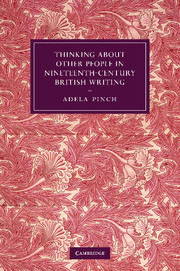Book contents
- Frontmatter
- Contents
- Acknowledgements
- Introduction: Love thinking
- 1 Thinking as action: James Frederick Ferrier's Philosophy of Consciousness
- 2 Foam, aura, or melody: theorizing mental force in Victorian Britain
- 3 Thinking in the second person in nineteenth-century poetry
- 4 Thinking and knowing in Patmore and Meredith
- 5 Daniel Deronda and the omnipotence of thought
- Conclusion: the ethics of belief and the poetics of thinking about another person
- Notes
- Bibliography
- Index
- Cambridge Cultural Social Studies
Conclusion: the ethics of belief and the poetics of thinking about another person
Published online by Cambridge University Press: 05 October 2010
- Frontmatter
- Contents
- Acknowledgements
- Introduction: Love thinking
- 1 Thinking as action: James Frederick Ferrier's Philosophy of Consciousness
- 2 Foam, aura, or melody: theorizing mental force in Victorian Britain
- 3 Thinking in the second person in nineteenth-century poetry
- 4 Thinking and knowing in Patmore and Meredith
- 5 Daniel Deronda and the omnipotence of thought
- Conclusion: the ethics of belief and the poetics of thinking about another person
- Notes
- Bibliography
- Index
- Cambridge Cultural Social Studies
Summary
A close look at Daniel Deronda's response to Gwendolen's claims that she has killed her husband “in her thoughts,” I suggested at the end of the last chapter, opens onto some larger areas in moral philosophy. It points to areas of debate about the ethics of belief and practical guilt in particularly illuminating ways. What are some of the “ideas about what the ethical force of a belief in the omnipotence of thought might be” that my reading of Daniel Deronda might lead us to consider?
The efficacy of beliefs justified on non-epistemic grounds was certainly an urgent issue for some nineteenth-century writers. The notion that there is an ethics to what one believes took particular forms in Victorian intellectual life: the topic often appears to us as part of the era's grand conflict between faith and science. We might begin by considering George Eliot's views. The position I've identified as Daniel Deronda's – that Gwendolen's belief is (probably) unfounded, but it is a sign of moral progress that she believes it – may seem to bear a family resemblance to Eliot's position on belief in God. Eliot tended to view religious belief as a potential means of moral development.
- Type
- Chapter
- Information
- Publisher: Cambridge University PressPrint publication year: 2010



